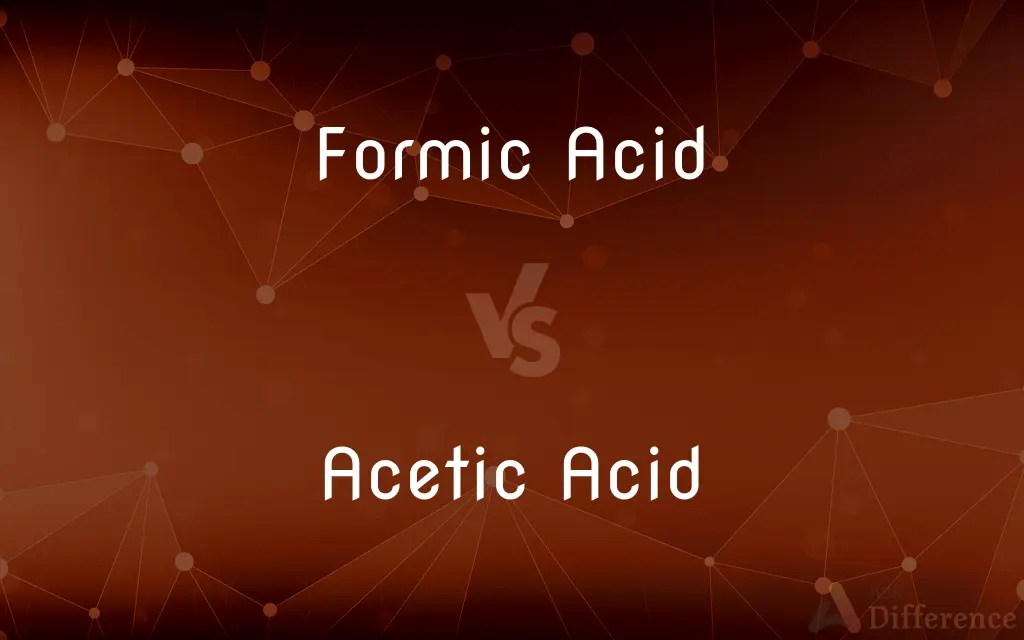Formic Acid vs. Acetic Acid — What's the Difference?
By Tayyaba Rehman — Published on January 12, 2024
Formic acid (HCOOH) is the simplest carboxylic acid, naturally found in ant venom, while acetic acid (CH3COOH) is the main component of vinegar, known for its sour taste and pungent smell.

Difference Between Formic Acid and Acetic Acid
Table of Contents
ADVERTISEMENT
Key Differences
Formic acid, with the chemical formula HCOOH, is the simplest type of carboxylic acid. It is naturally present in ant and bee stings, where it contributes to the painful sensation. In contrast, acetic acid, known chemically as CH3COOH, is a key constituent of vinegar and is characterized by its sour taste and strong odor.
Formic acid is used industrially in leather production and as a preservative. It is colorless and has a pungent odor. Acetic acid, besides its culinary uses, is employed in the production of synthetic fibers, plastics, and other chemicals. It is also a colorless liquid but is more known for its vinegar-like smell.
In terms of acidity, formic acid is a stronger acid than acetic acid. This is due to its molecular structure, where the ability to donate a proton is higher. Acetic acid, while still a weak acid, is less corrosive and hazardous compared to formic acid.
The production of formic acid often involves chemical synthesis from methanol, whereas acetic acid can be produced both synthetically and through biological processes like fermentation. The presence of acetic acid is notable in spoiled wine, which turns into vinegar as a result of bacterial activity.
In nature, formic acid serves as a defense mechanism for some insects. It has a significant role in various chemical processes in the industrial sector. Acetic acid, on the other hand, is widely recognized in the culinary world, not just for its flavor but also for its preservative qualities in pickling processes.
ADVERTISEMENT
Comparison Chart
Chemical Formula
HCOOH
CH3COOH
Natural Occurrence
In ant venom
In vinegar
Industrial Use
Leather production, preservative
Production of synthetic fibers, plastics
Acidity
Stronger acid
Weaker acid
Production Methods
Chemical synthesis from methanol
Synthetic production and fermentation
Compare with Definitions
Formic Acid
Natural preservative
Formic acid acts as a preservative in animal feed.
Acetic Acid
Chemical reagent
Acetic acid is often used in laboratory settings.
Formic Acid
Simplest carboxylic acid
Formic acid is found in the stings of ants.
Acetic Acid
Used in culinary applications
Acetic acid is essential for pickling vegetables.
Formic Acid
Industrial chemical
Formic acid is used in dyeing and finishing textiles.
Acetic Acid
Production of synthetic materials
Acetic acid is used in making acetate fibers.
Formic Acid
Used in leather production
Formic acid is essential in tanning leather.
Acetic Acid
Main component of vinegar
Acetic acid gives vinegar its sour taste.
Formic Acid
A component of ant venom
Ants inject formic acid as a defense mechanism.
Acetic Acid
Fermentation byproduct
Acetic acid forms when wine turns to vinegar.
Common Curiosities
Is formic acid naturally occurring?
Yes, particularly in ants and bees.
Can acetic acid be synthesized artificially?
Yes, it's produced both synthetically and through fermentation.
Is formic acid more corrosive than acetic acid?
Generally, yes, due to its stronger acidic nature.
Is formic acid used in the food industry?
Yes, as a preservative and antibacterial agent.
Is vinegar a good source of acetic acid?
Yes, vinegar is primarily diluted acetic acid.
Are both acids used in industrial applications?
Yes, each has unique industrial uses.
Is acetic acid important in winemaking?
Yes, it's a key component in vinegar, which can form from wine.
Can acetic acid be found in household products?
Yes, primarily in vinegar used in cooking.
Are these acids considered weak or strong?
Formic acid is a stronger acid than acetic acid, but both are considered weak acids.
Is formic acid more acidic than acetic acid?
Yes, formic acid is a stronger acid.
Are both acids colorless?
Yes, they are typically colorless in their pure forms.
Do both acids have similar boiling points?
No, their boiling points differ due to their different molecular structures.
Can formic acid be harmful?
Yes, especially in high concentrations.
Does formic acid have a distinct smell?
Yes, it has a strong, pungent odor.
Can acetic acid be used in cleaning?
Yes, due to its acidic properties.
Share Your Discovery

Previous Comparison
Magnesium Chloride vs. Magnesium Sulfate
Next Comparison
First Language vs. Second LanguageAuthor Spotlight
Written by
Tayyaba RehmanTayyaba Rehman is a distinguished writer, currently serving as a primary contributor to askdifference.com. As a researcher in semantics and etymology, Tayyaba's passion for the complexity of languages and their distinctions has found a perfect home on the platform. Tayyaba delves into the intricacies of language, distinguishing between commonly confused words and phrases, thereby providing clarity for readers worldwide.













































